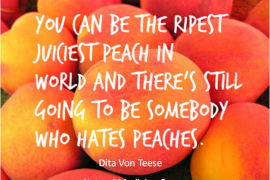No matter how perfect you think you are there is always going to be someone who does not like you. Jesus Christ was the greatest person who ever lived yet he was disliked by many people. It does not matter how hard you try there will always be someone who does not like what you stand for.
In this article Brené Brown a research professor at the University of Houston Graduate College of Social Work discusses why perfection is impossible, yet many people still spend time and energy trying to attain it.
Why, when we know that there’s no such thing as perfect, do most of us spend an incredible amount of time and energy trying to be everything to everyone? Is it that we really admire perfection? No — the truth is that we are actually drawn to people who are real and down-to-earth. We love authenticity and we know that life is messy and imperfect.
We get sucked into perfection for one very simple reason: We believe perfection will protect us. Perfectionism is the belief that if we live perfect, look perfect, and act perfect, we can minimize or avoid the pain of blame, judgment, and shame.
We all need to feel worthy of love and belonging, and our worthiness is on the line when we feel like we are never ___ enough (you can fill in the blank: thin, beautiful, smart, extraordinary, talented, popular, promoted, admired, accomplished).
Perfectionism is not the same thing as striving to be our best. Perfectionism is not about healthy achievement and growth; it’s a shield. Perfectionism is a 20-ton shield that we lug around thinking it will protect us when, in fact, it’s the thing that’s really preventing us from being seen and taking flight.
Living in a society that floods us with unattainable expectations around every topic imaginable, from how much we should weigh to how many times a week we should be having sex, putting down the perfection shield is scary. Finding the courage, compassion and connection to move from “What will people think?” to “I am enough,” is not easy. But however afraid we are of change, the question that we must ultimately answer is this:
What’s the greater risk? Letting go of what people think — or letting go of how I feel, what I believe, and who I am?
So, how do we cultivate the courage, compassion, and connection that we need to embrace our imperfections and to recognize that we are enough — that we are worthy of love, belonging, and joy? Why we’re all so afraid to let our true selves be seen and known. Why are we so paralyzed by what other people think? After studying vulnerability, shame, and authenticity for the past decade, here’s what I’ve learned.
A deep sense of love and belonging is an irreducible need of all people. We are biologically, cognitively, physically, and spiritually wired to love, to be loved, and to belong. When those needs are not met, we don’t function as we were meant to. We break. We fall apart. We numb. We ache. We hurt others. We get sick.
There are certainly other causes of illness, numbing, and hurt, but the absence of love and belonging will always lead to suffering.
As I conducted my research interviews, I realized that only one thing separated the men and women who felt a deep sense of love and belonging from the people who seem to be struggling for it. That one thing is the belief in their worthiness. It’s as simple and complicated as this:
If we want to fully experience love and belonging, we must believe that we are worthy of love and belonging
to read more please click here
Source: cnn living



